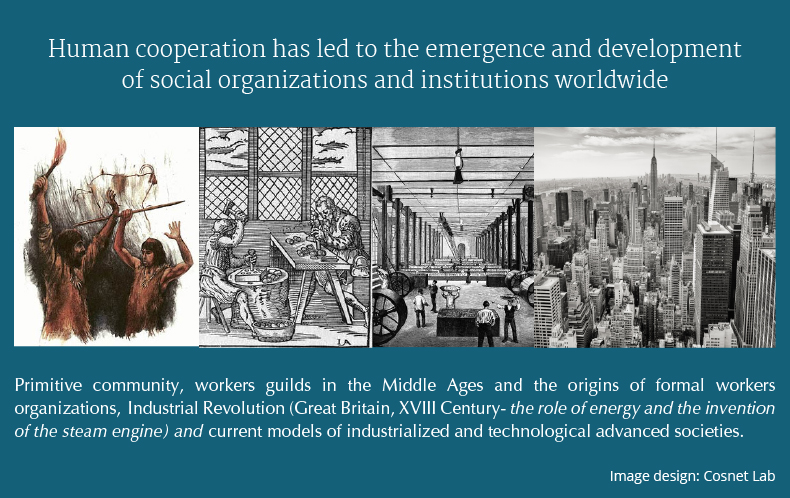Cooperation Among Humans
Cooperation in Humans Game Theory Prisoner´s Dilemma & Social Dilemmas Philosophical Approach
Cooperation in Humans

Over the years, the scientific community has devoted much time and effort to the study of cooperation among humans. Even today, it remains an important subject of study spanning many disciplines and still leads to heated and controversial debates among researchers of various scientific fields such as: economists, biologists, mathematicians, physicists, ecologists, sociologists, etc. When the different known mechanisms that govern animal behavior are naively extrapolated to the arena of social relations among humans, it becomes evident that it is extremely difficult to understand and explain the observed interaction patterns and the rules that govern human behavior. As we have already argued in other sections as well, cooperation is ubiquitous in nature and it can be seen at all levels of biological organization from molecules to populations. The implementation, development and maintenance of more effective and lasting structures of human and societal organizations have also been possible thanks to cooperation. Cooperation also contributed to the survival and evolutionary success of man as a species. In this regard:
- Human cooperation is a widespread phenomenon that shows up between both related and unrelated individuals. Humans are prone to cooperate, even with strangers and exhibit a lot of adaptations for sociality, which is regularly evidenced by the fact that we are generally willing to cooperate with others and punish those individuals that do not follow this tendency.
- The emergence of human language as a highly elaborated and efficient signaling system has been of outmost importance in the evolution of cooperation.
- Societies are formed by large groups of individuals that work together to achieve their goals and objectives influenced by cultural rules, conventions and economic models.
- Man is a rational being able of creating concepts, develop new ideas and learn from the environment based on a rational thought, that is, in the use of logic and reason to comprehend and reveal the reality of the world. Social awareness allows individuals to be aware of the problems of the society, know its rules and also what is morally acceptable or not within a given group or community. This code of behavior enables individuals to better understand the social environment in which they live and effectively solve the problems and challenges they face every day. Developing social awareness involves learning about the dynamics of social relationships between different individuals, groups and communities.
- Human cooperative behavior has played a fundamental role in the emergence and development of cohesive social groups.
- The problems regarding social behavior and altruism in humans have not been properly solved yet.
However, despite all these facts and our accumulated knowledge about evolution and cooperation, we are far from understanding what are the mechanisms behind human cooperation. Solving this puzzle will allow us to design better ways to work and live together and also to optimize our chances of surviving as long as possible as a species. This is precisely at the root of our work, i.e., to understand what are the rules that lead to human cooperation. At variance with other lines of thinking, we believe that the only way to achieve this is by doing what science did since the beginning: observe the system under study (or do some experimentation) and then test the theory. If they don’t match, then, one should revise the theoretical assumptions and start again if needed.

